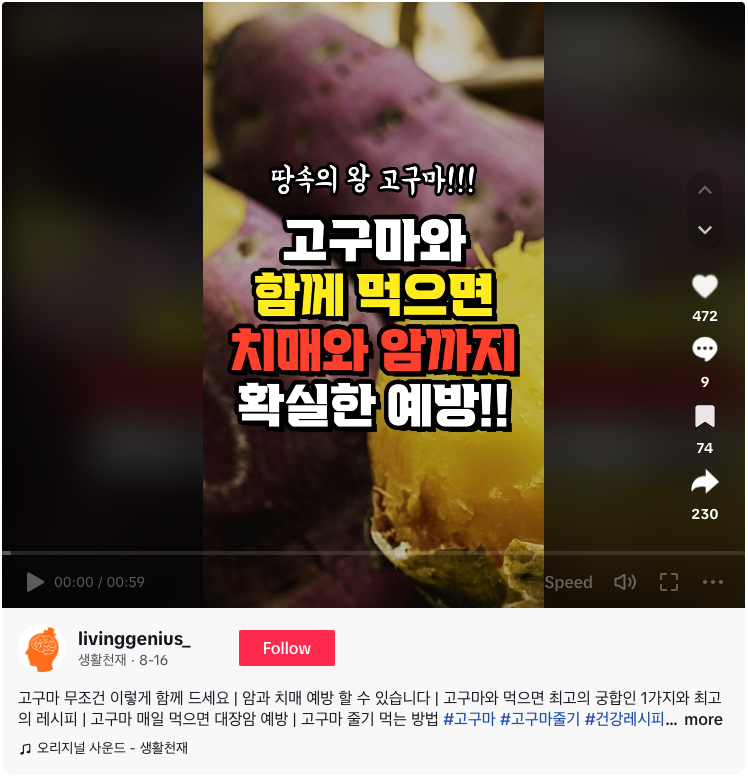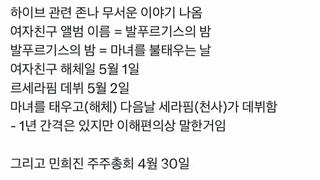
Does sweet potato and its stems prevent dementia and cancer? No, that's not true: Eating sweet potato, a starchy root vegetable, as well as its stems alone is not a definite preventative for dementia or cancer.
The claim appeared in a video (archived here) published by @livinggenius on TikTok on Aug. 16, 2023 under the title "땅속의 왕 고구마!!!" or "The king of the earth, sweet potato!!!"
It opened:
고구마와 함께 먹으면 치매와 암까지 확실한 예방!!
Or, as translated by Lead Stories staff:
Eating this with sweet potatoes will definitely prevent dementia and even cancer!!
This is what the post looked like on TikTok at the time of writing:
(Source: TikTok screenshot taken on Wed Sep 13 00:55:28 2023 UTC)
The video refers to Japanese sweet potatoes, also known as Murasaki sweet potatoes, which are a deep red or purple on the outside and white or creamy on the inside.
At the 00:10 timestamp, the video continues:
고구마가 갈변하는 이유는 얄라핀 성분 때문인데 놀랍게도 이 성분은 각종 암 특히 대장암 예방에 탁월합니다. 고구마에는 노화 지연 성분 베타카로틴이 매우 풍부해요. 베타카로틴을 많이 섭취한 사람은 치매 발병이 현저하게 떨어진다는 연구 결과도 있죠.
As translated by Lead Stories staff:
The reason why sweet potatoes turn brown is because of the yalapin component. Surprisingly, this ingredient is excellent at preventing various cancers, especially colon cancer. Sweet potatoes are very rich in beta-carotene, an aging-delaying ingredient. Studies have shown that people who consume a lot of beta-carotene have a significantly reduced risk of dementia.
The video says eating sweet potato and the stems of its leaves is recommended, claiming "it is even more effective if you fry with olive oil and then add a bit of perilla oil."
However, no single food can preven dementia or cancer on its own. A healthy diet is associated with a lower risk of dementia like Alzheimer's disease or various cancers, but there is no evidence that eating sweet potato and its stems alone can act as a preventative for either.
Dementia
Healthy eating patterns are associated with a reduced risk of dementia like Alzheimer's disease due to its cognitive benefits, but not all studies have shown a causal link between diet and cognition. "There is no evidence that eating or avoiding a specific food can prevent Alzheimer's disease or age-related cognitive decline," according to the National Institute on Aging (NIA).
The NIA's page states "evidence suggests, but does not prove," that following the Mediterratnean diet or similar diets, which focus on fruits, vegetables, whole grains and more as opposed to red meats, eggs and sweets, "might help to reduce the risk for Alzheimer's dementia or slow cognitive decline." The page lists current ongoing clinical trials that study the effects of these types of diets on dementia risk.
"There is no single food, beverage, ingredient, vitamin or supplement that has been proven to prevent or cure Alzheimer's or any other dementia," Heather Snyder, the vice president of medical and scientific relations at the Alzheimer's Association, said in an email.
She continued:
We must consider the person's entire diet. And diet must be considered as one part of the person's overall behavior and lifestyle. There is insufficient evidence that eating sweet potatoes alone will have any short- or long-term impact on cognition or dementia risk.
At this time, the best recommendation is to eat a modest, low fat, primarily plant-based diet in conjunction with an overall heart- and brain-healthy lifestyle.
Another diet associated with preserving cognitive function to protect against dementia is the Mediterranean-DASH Diet Intervention for Neurodegenerative Delay, also known as the MIND diet, according to a diet review by the Harvard T.H. Chan School of Public Health.
A 2019 study published in the Advances in Nutrition medical journal also found that the Mediterranean, MIND and Dietary Approaches to Stop Hypertension (DASH) diets may be associated with a lower risk of Alzheimer's disease.
Cancer
No single food protects against cancer by itself, according to the American Institute of Cancer Research, "But research shows that a diet filled with a variety of vegetables, fruits, whole grains, beans and other plant foods helps lower risk for many cancers."
Thomas Seyfried, a professor of biology at Boston College who researches mechanisms for managing cancer and other chronic diseases through metabolic therapy, said in an email that "Cancer arises when energy through fermentation replaces energy through oxygen-dependent respiration. This replacement leads to dysregulated cell growth or what is known as cancer."
He continued:
Cancer cells cannot survive in the absence of glucose and glutamine fermentation. Any diet that can enhance the efficiency of oxygen-dependent respiration will prevent cancer. Cancer cannot occur in cells with healthy mitochondrial function.
Seyfried pointed to the Glucose Ketone Index (GKI), a blood biomarker for cancer prevention and management that can be measured using the Keto Mojo blood glucose or ketone meter. He said that if eating sweet potatoes can prevent cancer only if low GKI values are maintained:
Low blood glucose levels coupled with elevated levels of blood ketones will produce low GKI values. GKI values of 1.0 or below will enhance mitochondrial function thus producing nutritional ketosis and preventing cancer. Any diet that can produce nutritional ketosis (GKI values of 2.0 or below) can prevent cancer.
Some studies on purple sweet potatoes, separate from the Murasaki sweet potatoes as described in the social media video, showed that the anthocyanins in the potatoes or the potato peels may protect against cancer or have anti-cancer properties. However, these studies were only conducted on animals like mice or in cell cultures, and not on humans.














